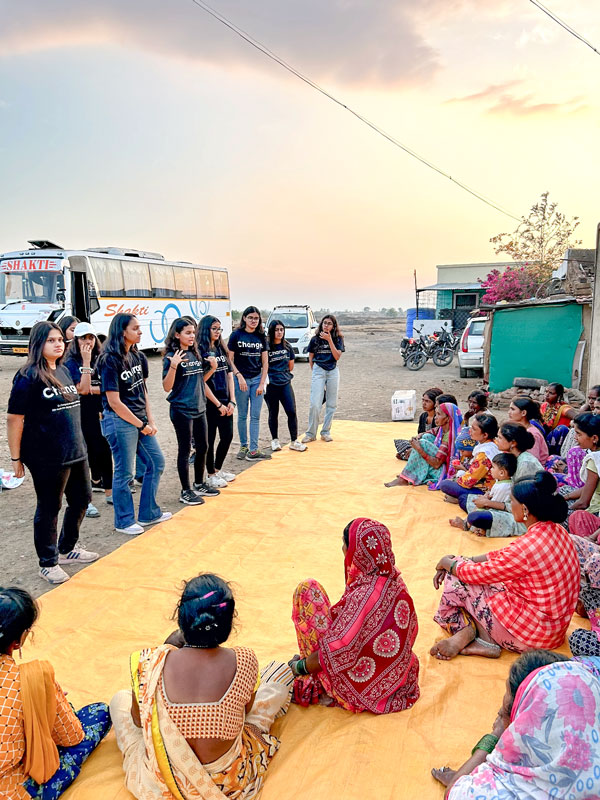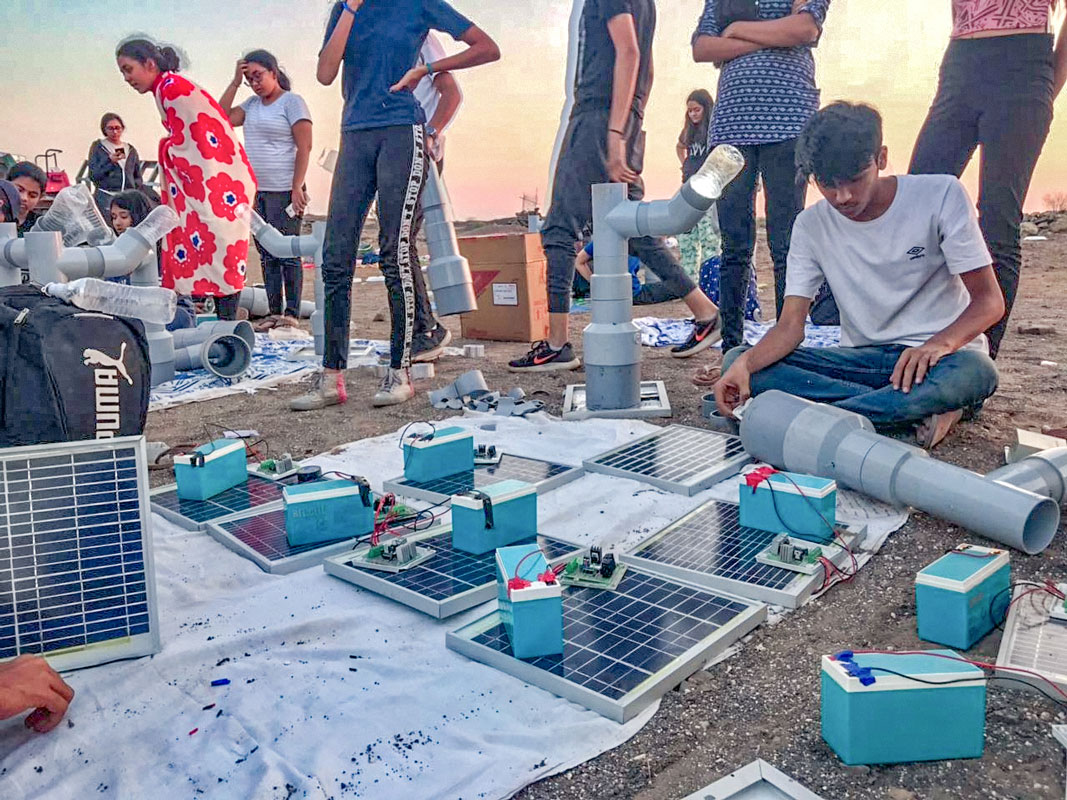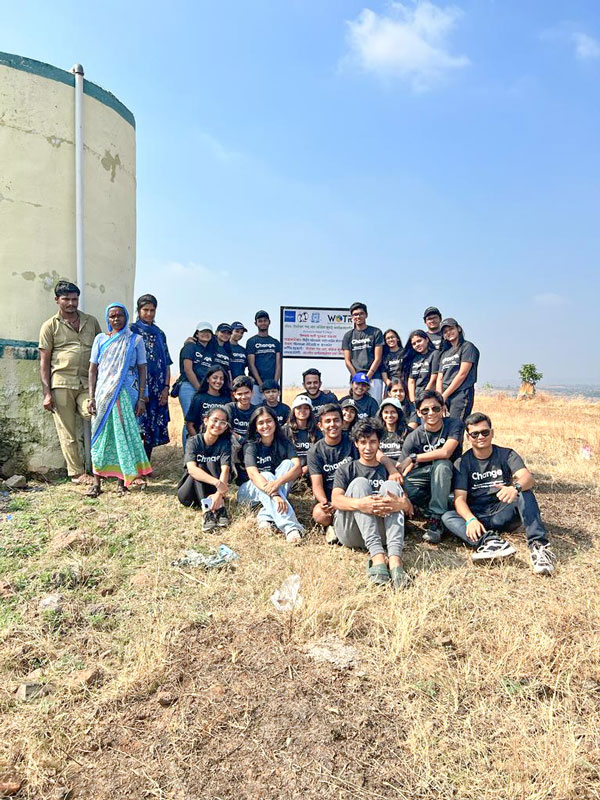Changing villages through a decade-long project
It is rare to find Rotaractors dedicated to a single project for over 10 years. RAC H R College, Mumbai, is one such Rotaract club in RID 3141 that has been focusing all its efforts towards developing a cluster of villages in Sangamner taluk, Maharashtra, since 2012, through its Project Aashayein.

Trisha Sanghvi, the then club president, wanted to do a community project which would “build a sustainable platform to provide water to drought-struck villages.” The club identified the village cluster in Sangamner taluk which was reeling in drought, poverty and darkness. Located on the rain-shadow region in Central Maharashtra, the villages had very little rainfall and were suffering from acute water scarcity. “The residents would walk for miles to access water. Khirpala village, located on the hills, is one of the worst affected. Women would spend 2–3 hours daily to fetch water from the foothills. Often the children accompany them and this affects their education,” says Rajaram Varpe, head of the taluk’s Village Development Committee.
The water crisis has resulted in harsh poverty in all these villages. Since a sizeable time is spent in fetching water daily, women are unable to help in the fields and crops could not be raised.
We built 17 wells, water tanks, three check dams, and installed several handpumps in villages across the taluka over this decade.
— Batul Chittorwala, project coordinator, RAC H R College, Mumbai
The club decided to adopt the village cluster for developmental work and designed the Project Boond to address the water crisis on priority. In collaboration with a Pune-based NGO Watershed Organisation Trust, “we built 17 wells, water tanks, three check dams, and installed several handpumps in villages across the taluka over this decade. The villagers are now able to draw water from the pipes installed close to their homes,” says Batul Chittorwala, the project coordinator for this Rotary year. In the later years, the Rotaractors expanded their service projects to encompass healthcare and sanitation, lighting, and education and entrepreneurship development, to bring about a holistic improvement in the villagers’ lives.
The volunteers frequently would visit the villages and discuss with the residents about their requirements and the development plans. Project Pankh takes care of overall health, hygiene and wellbeing of the villagers. Sanitary napkins are distributed to adolescent girls and women across the taluk, and “we are slowly introducing safer options such as menstrual cups among the older women,” says Dhvani Mistry, who, along with Gauri Kadam, is part of Team Social Initiatives. Seminars are held on menstrual hygiene, safe disposal of the pads, sex education and women’s safety; “with the men we talk about gender equity and sex education.” Two NGOs — Days for Girls Organisation and the Association Social Beyond Boundaries — support these endeavours. Dhvani points out that open defecation is a huge challenge in these hamlets. At the Kumbarwadi village, people have to walk 2km to reach the closest public toilet. There are just two toilets for a population of 750 residents here. “We will have to address this issue soon,” she adds.

In 2019, the club initiated Project Gazaab Maharashtra to promote entrepreneurship and financial independence among the village youngsters. Rotaractors would stay in these villages for a week every month and impart business education with a recommended syllabus from the Singapore Management University. On the eighth day the trainees will be encouraged to present their business ideas to the Rotaract panel. Seed capital will be given to the most sustainable and feasible projects.
Varpe highlights the success story of Ankita Kadari, a young beneficiary who successfully set up a tailoring unit. Now she is married and her business is also flourishing, he smiles. “Some of these youngsters have paid their college fees with the help of income generated from their business, and some are even supporting their families,” beams Bhagawat Ghagre, the committee secretary. “We have provided seed capital to 50 budding entrepreneurs across this taluka,” says Batul.
While some hamlets are located miles away from the power grids, in others such as the Dholdara village, homes of many villagers are plunged in darkness because they cannot afford the power bills. Since 2017 the Rotaractors have installed solar lights in four tribal villages. “We have provided various lighting solutions such as study lamps, torches, household lamps and street lights,” says Batul. The project is implemented with the support of the Liter of Light Organisation, Australia. “This year we are ready to provide solar lamps for 50 more households,” she adds.

Dhvani is excited to share that Project Aashayein was acclaimed as the ‘Outstanding Community Service Project in the South Asia Region’ by Rotary International in 2019.
The Rotaractors have become an extended family to the villagers. “Initially we had doubts as to what these children can do. But they proved us wrong, and in these 10 years their hard work has paid off,” says Varpe. Ghagre is amazed that the youngsters have learnt to adapt to challenging situations such as lack of proper accommodation and toilets. “It is heartwarming to think that they stayed to help us.”
The team however is thankful to the villagers for their hospitality and eagerness to learn. “They are down-to-earth and ensure that we are comfortable. They would feed us three meals a day. They think that we are helping them. But it is actually a two-way relationship,” smiles Batul.
The club, chartered in 1986, has 450 registered Rotaractors. “Ours is a vibrant club and all our Rotaractors fall in line with all the projects, be it community or personal development,” says club president Prit Jain.
In addition to the support from other NGOs and organisations, the club also raises funds for this project every year through various events. This year, the ‘Sell a Service’ event helped raise ₹88,500 in a single day. Maharashtra Chief Minister Eknath Shinde, complimenting the Rotaractors, also donated for the cause. The Matka March showcased club members balancing pots on their head and hip, copying the village women who had to carry water from long distances for their daily needs. It was a PR stunt to sensitise people about the plight of these women and it had a good media attention. A beach clean-up and a tree plantation campaign also formed part of the event.
This year the club inaugurated a well in a village with 390 families. Two hamlets were given solar lighting and sanitary pads were provided to 80 women to last them for eight months.
